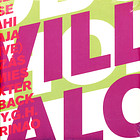Sometimes things come together that don’t belong together. The year 2003 saw not only the release of the album »Alcachofa«, but also the virtual opening of the iTunes Store. It was the first digital store where you could pay to download music legally on a massive scale. Not only whole albums, but also individual songs. Since then, people have regularly questioned the relevance of the album format and declared the era of the album over. In electronic dance music in particular, the functions of track and album are perceived as fundamentally different. One is destined for the dance floor, the other for the living room. But the reality is very different. Most techno and house artists still regard the album as the supreme discipline of music productio

Alcachofa
»Alcachofa« (Spanish for artichoke) was the first album by German-Chilean DJ and producer Ricardo Villalobos. It comes seven years after he released his first 12-inch. The album unleashes a force that not only raises and propels its creator in a new artistic direction, but contemporary electronic music as a whole. Of course, minimal techno existed before Alcachofa. In the ’90s, Robert Hood, Plastikman (Richie Hawtin), the Cologne-based Kompakt label around Wolfgang Voigt and others worked on a skeletal version of Detroit techno. »Alcachofa« is certainly influenced by this, as well as by the dub techno experiments conducted by Basic Channel, the project from Moritz von Oswald and Mark Ernestus.
But Villalobos’ music is so original that evolutionary musings on music do not seem appropriate. Villalobos deconstructs microhouse and minimal techno, takes what is left over and reassembles it. His tracks pulsate in a dubby, percussive groove. Rhythm becomes melody and vice versa. Danceability and experimental edge are no longer mutually exclusive. And beneath the rhythmic twists and turns, pop lies in a waking coma.
Other Spheres
»Easy Lee« and »Dexter« are the two tracks that frame—and define—the album. Apparently Villalobos sees it that way himself, as well. In 2015, he re-released it as a 12-inch on his own label, »Sei Es Drum«. »Easy Lee« begins with a vocoder voice that seems to have strayed from an old-school synth-pop track and evolves into a sublime techno-funk monster. The underlying melancholy on »Dexter« is broken by an almost euphoric melody. Tracks like these are typical of Villalobos’ trademark sound.
»Alcachofa« is an album full of contrasts, both dark and optimistic, and danceable and experimental. It marks the beginning of »auteur techno«. The nineties are over and with them the time when DJs and producers remained anonymous. DJs—including Ricardo Villalobos himself—would soon become stars, with all the undesirable side-effects.
»Alcachofa« marks the beginning of »author techno«. The nineties are over and with them the time when DJs and producers remained anonymous.
The first wave of minimal techno slowly ebbs away at the beginning of the new millennium. It flows almost seamlessly into the second wave, thanks in part to the influence of »Alcachofa«. The fact that most of this second wave is not worth mentioning cannot be blamed on Villalobos. He is soon to be seen floating in other artistic spheres.
Originally released on Playhouse 20 years ago, the album is now re-released on Perlon in an extended 4-LP version. This can be seen as an expression of retromania and the progressive self-archiving of techno and house. Or as recognition of a kind of music that has transcended the time of its own making. On »Alcachofa« two decades ago, Ricardo Villalobos had already arrived where many of his epigones have yet to arrive today.









